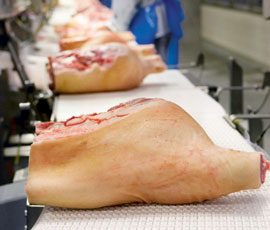Demand for UK pork supports expansion plans

Plans to significantly expand capacity at the UK’s largest pork processor could provide a much-needed boost for domestic pig producers.
Tulip Food Group currently slaughters 2.5 million pigs a year, equivalent to 30% of the total UK kill, but investment at two of its sites could give it the capacity to process up to 40% of the UK herd, chief executive Steve Murrells told Farmers Weekly at Tuesday’s (8 November) European Food and Farming Partnerships conference in London.
The focus of the expansion over the next three years will be on Tulip’s Dalehead Foods division, which is dedicated to supplying Waitrose with UK pork. Production capacity at its Ashton plant is planned to be increased from 15,000 pigs a week to 23,000 by early next year, while its Spalding site is due to be expanded from a capacity of 13,500 to 25,000 pigs a week by later in 2012.
“At the moment we’re looking to get the capacity in place before securing additional supplies, but I genuinely think there’s a requirement for UK raw material more than ever and I can see retailers wanting more product from the home market,” said Mr Murrells.
He and other speakers at the conference reckoned consumer demand for premium lines in supermarkets – such as Tesco Finest or Sainsbury’s Taste the Difference – had held up well in the face of economic turmoil and tighter spending. This was good news for UK producers, as such product lines majored on higher welfare and provenance, he said.
“Premium products appear more able to ride the storm that’s facing us, while other lower-end lines are being sucked into the market of people whose disposable income is getting less and less.”
A similar view was shared by Martyn Jones of Morrisons, who said shoppers’ buying habits had changed significantly since the recession, with people spending more time checking prices and managing their shopping budget. “But at the same time, they still expect fresh, high-quality and welfare-friendly food and they also want to buy British,” he said.
A recent survey by the supermarket had revealed one-third of shoppers put more emphasis on buying British than they did five years ago, with 74% citing a desire to support the British farming industry as the reason for doing so, he said. “Interestingly, only 5% said they bought British because it was cheaper, which suggests there are still bigger motivating factors than cost alone.”
Fairtrade products had also fared well during the difficult economic conditions, Mike Gidney of the Fairtrade Foundation added. UK sales had risen from £836m in 2009 to almost £1.2bn last year and “double-digit” growth was predicted for 2011. More major brands were now supporting Fairtrade, consumer awareness had improved considerably and 90% of shoppers said they trusted the Fairtrade brand, he said.
[Panel] Inflation pressure easing
Food price inflation is set to fall sharply over the next year as consumer spending remains tight and lower commodity prices filter through to shelves.
EFFP forecast food price inflation would fall to around 2% by this time next year, down from a peak of 7% this summer. This still meant food prices would continue to rise, but at a much slower rate than seen in 2010/11, EFFP senior partner Sion Roberts said.
“It’s a really challenging time for food businesses. Commodity prices and costs have come back a bit, but food is still 30% more expensive than prior to the start of the recession in 2008 and there’s significant tightening of consumer spending.”
